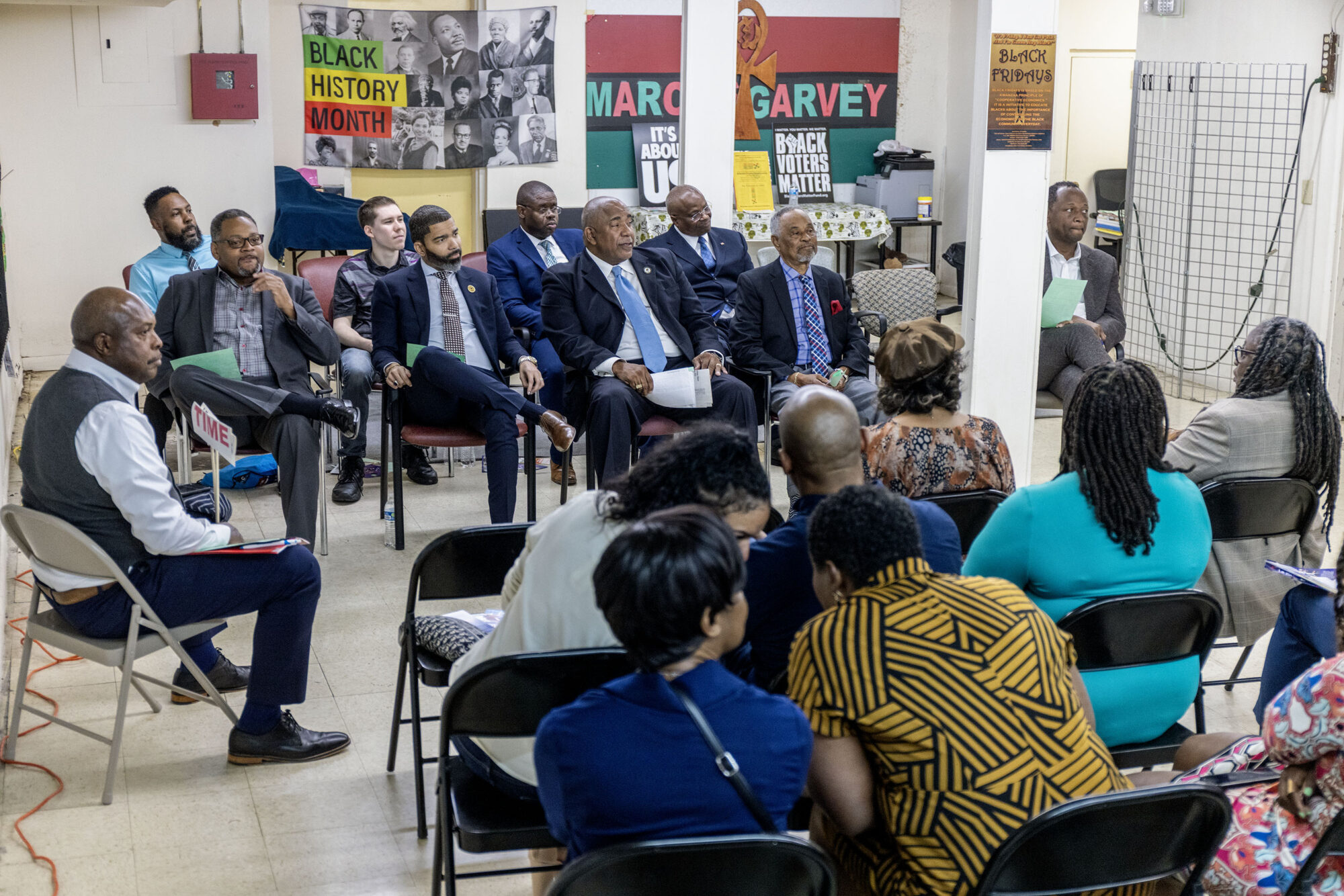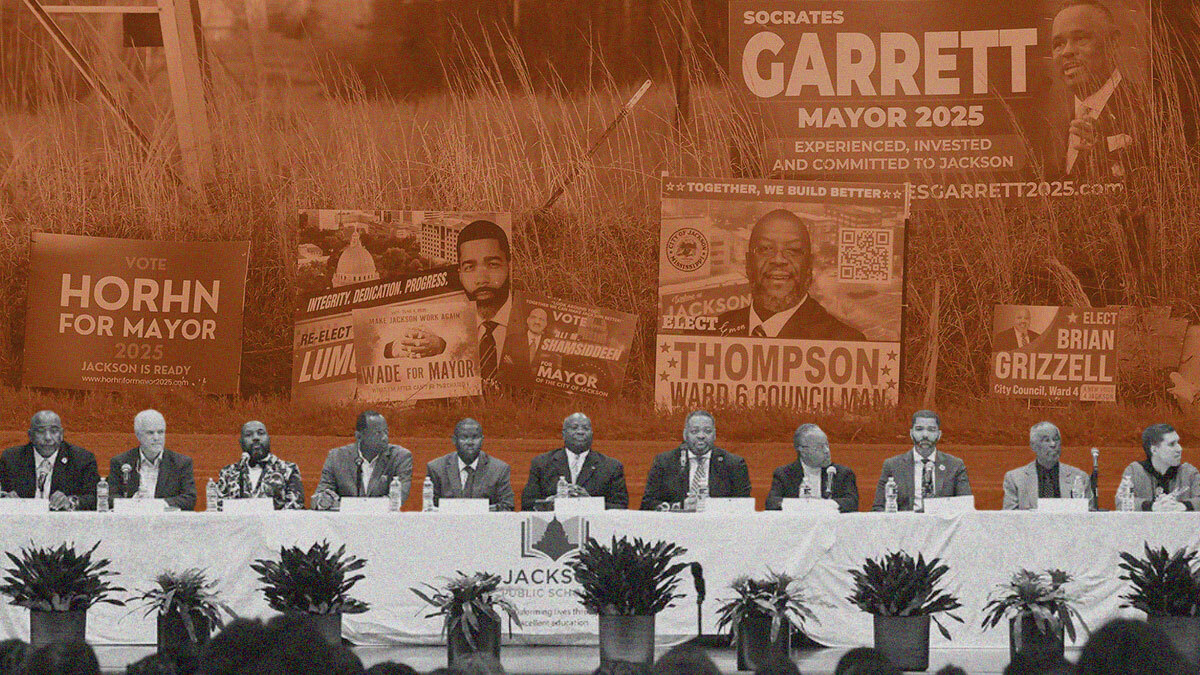
At the Anderson United Methodist Church earlier this month, 14 candidates vying for the mayor of Jackson sat hip-to-hip on the red carpeted stage.
Just four had experience serving as an elected official in government, while the rest included longtime businessmen, a child care development professional, the founder of a local nonprofit, a Christian rapper and a talk-radio host.
It took more than 45 minutes just for everyone to introduce themselves.
This year’s mayoral contest — a wide-open race with 19 mayoral candidates — should be a sign of healthy democratic engagement, and in some ways, it is.

“From our point of view, it just states that right now, this time, the community is highly engaged, and people are excited and feel the charge to step up to help Jackson’s future,” said Henry Goss, the communications director at the nonprofit MS Votes.
But for Jackson voters trying to make sense of a race with a dearth of campaign analysis and no reliable polling, democracy here is beginning to feel more like a puzzle than a privilege.
“It cuts both ways,” said Christopher Berry, a University of Chicago political scientist who studies municipal elections. “On the one hand, we know that democracy requires choice, and so when you see we have 12 candidates, you might say that’s great for democracy.”
But it’s possible, he continued, for voters to have “too much choice.”
READ MORE: Click here for more information about all of Jackson’s municipal candidates
The 2009, 2013 and 2017 mayoral elections each saw similarly stacked races of about 15 candidates. But with incumbent Mayor Chokwe Antar Lumumba under federal indictment and myriad issues at the front of voters’ minds, many Jacksonians are struggling to whittle down the crowded field to a few of the most serious candidates.
Independent candidates have been campaigning, adding to the number of bodies on any given stage, but most voters in the April 1 primary will be choosing between 12 Democrats to start — still a daunting number.
“When you give me 12 candidates and I don’t have time to become more informed about them, is that enhancing democracy or undermining democracy?” Berry said. “The answer is probably both.”
Many just aren’t sure how to make their decision.
“It’s too many daggone people,” Valerie Brown, a voter, said outside the Smith Robertson Museum after the Mississippi Poor People’s Campaign forum last week. “I don’t even know where these people come from.”
Brown did everything an informed citizen should: The 51-year old mail carrier attended a two-hour candidate forum, listened to the six men on the stage, and asked a question.
She still left not knowing who she’s voting for.
“Why are you just now coming,” Brown said she’d like to ask the candidates she’s never seen before. “Where have you been? What have you done prior to coming here? So if you just fell from the sky, what you gonna do different?”


Brown, who ultimately decided to vote for Lumumba, had been considering someone new this election, like candidate Marcus Wallace, a former mayor of Edwards with whom she has her own experience: Years ago, he donated to a toy drive she helped organize.

Connections matter to Jackson voters, said Nsombi Lambright-Haynes, the executive director of OneVoice, a nonprofit organization focused on civic engagement that sponsored the forum at Anderson UMC. Lambright-Haynes is also Lumumba’s campaign coordinator.
“In my experience being a Jackson resident, people tend to choose the person that resonates with them the most, the person that they kind of feel touches them in the most personal way,” she said.

At several forums, Lumumba has leaned on his relationships with the city’s activist community, commenting on how many faces in the room he recognizes.
Wallace has repeatedly drawn attention to his status as a graduate of Callaway High School, while personal injury attorney Delano Funches touts his alma maters Jim Hill High School and Jackson State University.

At last week’s forum at Forest Hill High School, Kim Wade, an independent candidate with a popular conservative talk-radio show, kept making the teenage audience laugh.
“I noticed that too,” said Jeremiah Wilson, a Lanier High School senior who is voting in the April 1 primary.

“But I told them, you can’t just go off this one conference,” he added. “You gotta do your research, see what these people really are.”
Name recognition also matters. John Horhn, who’s running for mayor for the fourth time and secured the backing of a number of influential groups, including the public worker’s union, has served in the Mississippi Legislature since 1993.

Voters may remember Socrates Garrett, a longtime city and state subcontractor and founder of the Mississippi Link newspaper. The same goes for David Archie, whose antics as a Hinds County supervisor kept his name in the headlines.
“Of course, everybody knows David Archie,” Brown said.

And, in a city that’s 85% Black, political party makes a difference. Though the Democratic primary is a competitive race, Jackson hasn’t gone for a Republican or independent candidate in half a century, since before the parties were what we know them as today.
“As long as voters know the party of the candidate, they can make a pretty good choice even without much further information about the individuals,” Berry said.
That’s one advantage of the two-party system, he added. In political science, a voter is considered “informed” if they end up voting for the candidate they would have chosen had they consumed the entirety of the candidate’s backgrounds and positions, even if the voter is really only working from limited information.

“It might still turn out to be bad,” Berry said. “I might be voting for a guy who turns out to be a bad guy, but if that’s the vote I would’ve taken with all the research, then that’s the best vote I could’ve cast.”
In rare cases, a voter’s choice could simply come down to who’s at the top of the ticket. When Jackson voters go to the polls, each ballot in the Democratic and Republican primaries will list the candidates in the same alphabetical order, the city clerk, Angela Harris, confirmed.
In the Democratic primary, every ballot will start with Archie at the top. This could give Archie a 1-2% bump, Berry said. It’s small, but in a crowded race, it could make a big difference.
“Ballot order effects are real,” he said. “It is true. Candidates higher on the ballot tend to get more votes.”
Archie’s name will be followed by James “Blue” Butler, a retired plumbing contractor, Lakeisha Crye, a mental health nurse practitioner, Funches, Garrett, Tim Henderson, a military consultant, James Hopkins, a community activist, Horhn, Lumumba, Kourtney Christopher Paige, Wallace and Albert Wilson, a nonprofit founder.







It’s likely the Democratic primary will go to a runoff April 22, which Berry said will help voters narrow the field to the most serious candidates.
“The whole institution of the runoff is meant to remedy the problem you’re describing of ‘too many candidates, too many choices,’” he said, before adding, “in an ideally functioning system.”
Regular Jacksonians are trying to help each other make sense of it all.
John Zehr, a copywriter in northeast Jackson, said he was tired of complaining about the government in Jackson and wanted information on the candidates that came from an authoritative, unbiased source. He’s not very politically involved, but conservative-leaning, and has been dissatisfied with news media coverage.
So with the help of ChatGPT (and a few politically savvy Jacksonians), he came up with questions, contacted all the candidates he could, and posted Zoom-recorded answers from the 10 candidates who responded to a website he named “IWantToBeYourMayor.com.”
Voters can watch the primary source of information on the candidates — themselves — and use a scoresheet Zehr created to determine who they should vote for. He estimates he put more than 100 hours of work into the website, strictly as a community service.
“I think the problem with democracy, as it exists today, is that it’s marketing and spin, right,” he said. “I wanted a format where, without any input from me … what would come out of the candidates would be unfiltered.”
In a video introducing the website, Zehr also encouraged voters to attend forums, get with the candidates face-to-face, “look them in the eye, see what kind of gut feel you get from them, and if you can discern whether or not they’re the kind of people who really know what they’re talking about and people who keep their word,” he said.
The post With 19 mayoral candidates, do Jackson voters have ‘too much choice’ this election? appeared first on Mississippi Today.

